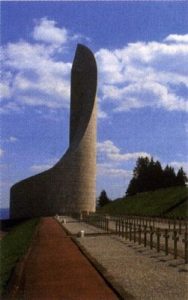The deported
The victims of the Gestapo were of many different origins, either « political prisoners », such as the « Gaullists » accused of acts of resistance – often arrested by the Vichy police and transferred to the Gestapo ; or Jews, or Spanish Republican refugees in France ; or gypsies ; or Alsatians accused of being pro-France ; or people labelled « common offenders » accused of various offences against the occupant. The work of the World War II history committee has only indicated a rough estimate of the number of deported and survivors. It is known that of the 75,721 Jews deported from France, only 2,567 came back. For other groups the estimate is 230,000 deported, but the death rate cannot be accurately calculated, as a great number of disappearances will never be elucidated.
Could the percentage of deported Protestants be higher than that of the overall population ? Some, like Germaine Tillon, have suggested this hypothesis, but no statistics confirm it.
The concentration system forbade religious manifestations
The absolute horror of Hitler’s system of elimination implemented by Himmler will not be described here. Many a testimony bears witness to it. French public opinion became aware of it after April 1945, with the arrival of the first survivors.
Any religious manifestation was absolutely forbidden, as pastor Bonifas said « mentioning spiritual life in concentration camps should be done very cautiously ».
Individual prayer, rare clandestine worship often in indescribable conditions. Many writings mention prominent figures who testified to their inner freedom and their solidarity in keeping with their spiritual strength.





